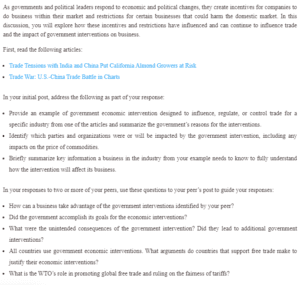Government Trade Interventions
Tariffs
Tariffs are some of the approaches used by the government to control international trade. They refer to a tax levied on imported goods by the importing country. Imposing tariffs primarily aims to collect revenue and protect domestic industries (McLure, n.d.). Tariffs intended to raise revenue still have a protective influence. Besides, the taxes designed to offer a protective effect can also be a revenue source for the government.
As per the BBC’s Daniele Palumbo (2019), the US-China trade war is a classic example of tariffs. The US government imposed $200 of tariffs on Chinese goods in the US market. One of the reasons put forward by the US government is that the taxes responded to a longstanding trade deficit between the US and China. The US feels that China has unfairly skewed its trade practices to exclude the US, yet the latter imports many products from China. Besides, the tariffs sought to pressure the Chinese government against favoring domestic companies through subsidies. Such subsidies make it hard for US companies in China to operate competitively.
Impact of Tariffs
The imposition of tariffs has led to a game of retaliation, leading to a major trade war in economic history. Some Chinese goods targeted by the new tariffs include computer parts, furniture, processing units, and telecommunication equipment (Palumbo, 2019). On the other hand, China has equally targeted American goods (vegetables, whiskey) with tariffs (Palumbo, 2019). The result is a price hike affecting consumers in both countries. The battle has also hit the stock market, with the Chinese Yuan plummeting against the US dollar.
What Businesses Ought to Know
The tariffs imposed by China and the US are akin to elephants dancing and eventually hurting the ground. Businesses from either side should focus on their profit margins, regardless of the tariffs (McLure, n.d.). Accordingly, this includes negotiating for favorable deals despite the hikes. It is also helpful for businesses to understand their customers to not transfer costs to consumers and scare them away. Also, international companies should stay in touch with foreign exchange officers to guide them about new and changing policies.
References
McLure, C. (n.d.). Tariff – Import duties. Encyclopedia Britannica. Retrieved March 12, 2021, from https://www.britannica.com/topic/tariff/Import-duties
Palumbo, D. (2019, May 10). Trade war: US-China trade battle in charts. BBC News. https://www.bbc.com/news/business-48196495
ORDER A PLAGIARISM-FREE PAPER HERE
We’ll write everything from scratch
Question
As governments and political leaders respond to economic and political changes, they create incentives for companies to do business within their market and restrictions for certain businesses that could harm the domestic market. In this discussion, you will explore how these incentives and restrictions have influenced and can continue to influence trade and the impact of government interventions on business.

Government Trade Interventions
First, read the following articles:
- Trade Tensions with India and China Put California Almond Growers at Risk
- Trade War: U.S.-China Trade Battle in Charts
In your initial post, address the following as part of your response:
- Provide an example of government economic intervention designed to influence, regulate, or control trade for a specific industry from one of the articles and summarize the government’s reasons for the interventions.
- Identify which parties and organizations were or will be impacted by the government intervention, including any impacts on the price of commodities.
- Briefly summarize key information a business in the industry from your example needs to know to fully understand how the intervention will affect its business.
In your responses to two or more of your peers, use these questions to your peer’s post to guide your answers:
- How can a business take advantage of the government interventions identified by your peer?
- Did the government accomplish its goals for the economic interventions?
- What were the unintended consequences of the government intervention? Did they lead to additional government interventions?
- All countries use government economic interventions. What arguments do countries that support free trade make to justify their economic interventions?
- What is the WTO’s role in promoting global free trade and ruling on the fairness of tariffs?

